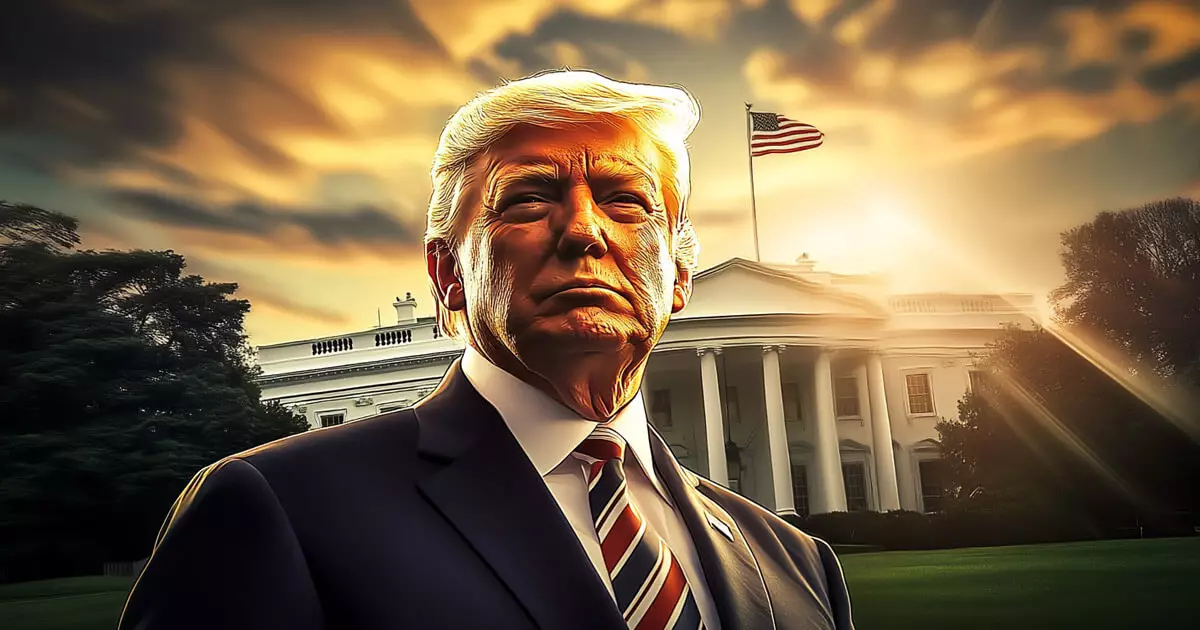As President-elect Donald Trump prepares to enter the oval office, he faces an increasingly complex landscape surrounding the cryptocurrency industry. The Blockchain Association, which represents over 100 key players in the crypto sector, has issued a compelling letter urging immediate action to position the United States as the global leader in blockchain technology. The crux of their argument centers on the urgent need for a comprehensive regulatory framework that promotes innovation while ensuring consumer protection. A well-designed policy approach is paramount to fostering a conducive environment where cryptocurrency firms can prosper, rather than being stymied by opaque regulations that create uncertainty and fear.
One significant hurdle highlighted by the Blockchain Association is the discriminatory banking practices plaguing the crypto industry. Many banks refuse to establish relationships with cryptocurrency firms, limiting their access to essential financial services. This “debanking” phenomenon not only hampers the operational capabilities of legitimate businesses but also undermines the competitiveness of the U.S. in the global market. By prioritizing legislation that ends these practices, the incoming administration can create a more level playing field. Specifically, the association cites the influence of the Federal Deposit Insurance Corporation (FDIC) in encouraging banks to restrict services to crypto companies, revealing the urgent need for a clarifying stance from federal agencies.
The current regulatory environment is characterized by what many in the industry label as “regulation-by-enforcement.” This approach, which has led to confusion and hesitation among potential innovators, is a significant barrier to the crypto industry’s growth. The Blockchain Association advocates for a transition towards proactive regulation that prioritizes transparency and innovation. For example, rolling back punitive guidelines such as SAB 121 would alleviate undue burdens on crypto businesses. Rather than constraining the industry through enforcement actions, a collaborative approach that includes input from industry leaders could pave the way for a more supportive regulatory landscape.
Another critical area of concern is the leadership within regulatory bodies such as the Securities and Exchange Commission (SEC) and the Treasury Department. The Blockchain Association emphasizes the need for new appointments that align with a more favorable and forward-thinking regulatory environment. The request for a new SEC chair, particularly following Gary Gensler’s announcement of his impending departure, highlights the critical role that leadership plays in shaping the industry’s future. A fresh perspective within these agencies could restore confidence and foster an atmosphere where cryptocurrency companies can thrive without constant fear of crackdowns.
The issue of taxation in the cryptocurrency sector also warrants attention, as overreaching tax policies can drive innovation outside U.S. borders. The Blockchain Association is urging a reevaluation of existing tax guidelines to create a more business-friendly environment. Clarity regarding crypto taxes, especially concerning the contentious Broker Rule, is essential to sustain burgeoning companies and attract talent. The potential exodus of companies seeking more favorable tax conditions abroad poses a significant threat to America’s leadership in digital asset innovation.
Finally, the formation of a public-private advisory council is proposed as a solution for ensuring balanced and effective policymaking. Such a council would facilitate ongoing dialogue between the government and industry stakeholders, promoting the creation of regulations that genuinely benefit both parties. By involving industry leaders in regulatory discussions, the administration can craft policies that are pragmatic and responsive to the needs of the market.
As the Trump administration looks ahead, the Blockchain Association’s recommendations present a roadmap for revitalizing America’s standing in the cryptocurrency space. By addressing the regulatory needs, combatting banking discrimination, and re-evaluating tax policies, the U.S. can reclaim its position as a leading player in blockchain technology. The coming months offer an opportunity for transformative change—a chance for the United States to harness the potential of the digital economy and solidify its role as a global hub for innovation.


Leave a Reply